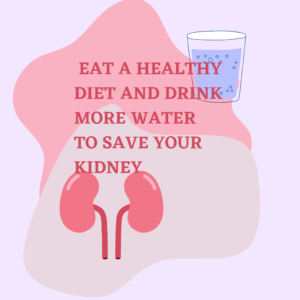Kidney Illness: A critical health issue and how to tackle it.
Kidney Illness develops when Kidneys are no longer able to filter properly. Let us look at how Kidneys gradually lose their functionalities. Kidneys constitute Nephrons, basic functional units of Kidneys that are responsible for all the filtering actions. Generally, our food involves a lot of sugar and fat. The primary function of our Kidneys is to filter out the excess fat and sugar from the body. However, if the levels of Sugar and Fat are high, the Nephrons start deteriorating with time. A time comes when Nephrons completely lose their ability to filter waste and become dysfunctional. Damaging to Nephrons marks the beginning of Kidney Illness. Kidneys stop filtering waste and do not retain proteins like Albumin which is necessary for your body. As a result, the overall metabolism of the body is imbalanced. What follows is an inductive effect on other organs as well. Kidney illness also affects Gut Microbiota, a group of micro-organisms living in the digestive tract. Gut Microbiota is responsible for the digestion of food, producing vitamins, and maintaining immunity of the body.
A few of the Symptoms of Kidney Illness are:
- Fatigue, weakness, lack of energy, and pale skin due to anemia
- Itching
- Frequent urination, especially at night
- Fluid retention, swelling around legs and eyes
- Loss of appetite, nausea, and vomiting
- High blood pressure
- Numbness in feet or hands due to peripheral neuropathy
- Disturbed sleep
- Bone pain and fractures
- Restless legs syndrome
- Chest pain due to inflammation around the heart
- Shortness of breath from fluid in the lungs
- Easy bruising, bleeding, and poor blood clotting
- Altered mental status
- Decreased sexual interest and erectile dysfunction
- Change in energy level or strength
- Lightheadedness
- Headaches
The above list is enough to convince anyone that Kidney Illness is a serious health issue and requires precautionary measures.
Following are a few things that can be adapted to your lifestyle to protect against kidney Illness:
- Eat a healthy diet: A balanced diet that is low in salt and saturated fats, and high in fiber, fruits, and vegetables can help protect your kidneys.
- Drink Water: Water strengthens Kidneys by helping them filter waste more efficiently. Water also revitalizes your body.
- Avoid Alcohol and Smoking: Smoking and Alcohol are two dangerous vices. They are capable of rupturing the immunity and vitality of the body.
- Exercise and have a healthy weight: Exercising keeps a check on your weight and eliminates harmful toxins. Toxins get concentrated in the body and need removal from time to time. Exercising helps in minimizing toxins.
- Know your Family’s health history: Some Kidney illnesses can pass on from one generation to another generation. Knowing your family’s health history makes you aware of your chances of having a kidney problem. Stay hydrated: Drinking enough water helps your kidneys filter waste products and toxins from your body. Aim for at least eight cups (64 ounces) of water per day, or more if you are physically active or live in a hot climate.
- Manage chronic conditions: Chronic conditions such as diabetes and high blood pressure can damage your kidneys over time. Work with your healthcare provider to manage these conditions and keep them under control.
- Limit over-the-counter medications: Some over-the-counter medications, such as non-steroidal anti-inflammatory drugs (NSAIDs), can be harmful to your kidneys if taken in excess. Talk to your healthcare provider about any medications you take regularly.
Kidney Illness is one of the worst emerging health issues of our times. Many people suffer from it. Proper care with good precautionary measures can keep it at bay.
